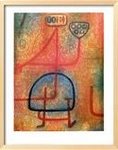Why do we wear nametags at the MLA?
I've just returned from the annual convention of the Modern Language Association (MLA), the umbrella organization for academic professionals in the fields of language and literature.
This is my third MLA in a row: last year I had job interviews (conventionally held there); the year before, I presented a paper on English lessons in Shakespeare (I can trace my current job to that paper: amen); and this year, I presented my research on the first textbooks printed (in the sixteenth century) to teach English. It went very well, thanks (indeed, many thanks to those who were in attendance, who fielded such great questions).
Conference participants receive their nametag as a form of receipt upon registration. To my knowledge, however, the nametag itself is only needed, or tendered for show, to enter the "book hall," a quasi-marketplace where academic publishers vend their goods at a discount to convention registrants.
And yet, hours after the book hall has shut and every panel has wrapped for the day -- nay, every waking hour of the conference, in hotel lobbies, at restaurants, in coffee houses, and all along the street -- you will see Spanish teachers and Wordsworth experts with nametags dangling from their necks.
(An easy mark.)
Far be it from me to reproduce stereotypes about the anti-social character of academics, but we are not the glad-handing type. That is, when I imagine conventions in other industries, I presume that the nametag performs an essential function related to networking. The MLA, indeed any academic conference, means to foster communication between members of the field. For better or for worse, however, our field comprises individuals who relish their solitude while they read, or write, or conduct research. The chief mode of communication at the academic conference is the panel presentation, in which three or more speakers stand at a dais to read prepared papers to an assembled audience; a question-and-answer period is mandatory, but perennially (and often sadly) brief. Finally, no protocol exists for one faculty member (or graduate student) to approach an unknown colleague with a hearty, "Hi, I'm Gwynn, from the Kingston office. I see you're based in New Haven. . ." No, that's not the done thing: wouldn't be seemly.
Such meetings of the minds a dream deferred, what happens is that MLA nametags incite close reading -- not too close, mind you, you don't want to get caught -- as we surreptitiously eye the names and institutions displayed on oneanother's chests. . .
I know: as if furtively contemplating ces documents du décolletage is any more seemly? (Nay, I know not seems, madam.)
In my reading of the phenomenon, the MLA nametag provides the opportunity either to say to one's familiars, "I was just on the elevator with Stephen Greenblatt," or, if you're Stephen Greenblatt, to show that you are (and go up and down the elevator?).
I'm picking on Greenblatt arbitrarily here. For all I know he doesn't wear a nametag; I haven't worn mine, but chiefly because I felt I didn't have a name worth reading (which is to say, worthy of reporting). That the book hall is the one place where just about everyone drops in at one point -- wearing their nametag (dems be da rules) -- speaks volumes about our professional character(s), in that we visit the hall not only to purchase our stock, but also to consume one another (most discreetly), and see how we stack up.
In that sense, the MLA nametag does more than prompt close reading. In a field that rewards scholarly individuality and distinction, the nametag gives us a name, which is to say, an identity, at a convention whose calling card could be professional anonymity, if not anomie.
Each year, the MLA attracts tens of thousands of academic professionals. At any given time, there might be a hundred different panels in session on an equal number of different topics. College and university departments hold their own independent receptions, and thousands of job seekers arrive for their job interviews. Finally, conference participants are housed in a dozen hotels throughout a given city (this year in Philadelphia; it was supposed to be held, pre-Katrina, in New Orleans). Far from convening its members so as to promote collective identification, let alone effervescence, the MLA is positively post-modern in its scatteredness, and must send many of its participants home feeling alienated to the operations of the mother ship.
In this respect, the MLA nametag grants its wearer an essential badge of belonging, a symbol of attendance, in ways that compensate (as a form of receipt) for his or her otherwise benign neglect. Read between the lines and the nametag says, "not only have I registered, but I have also arrived. You can see it, right here. Right here on my chest."
In a field so preoccupied with the powers and limits of language, if not with naming itself -- from Platonic nominalism to Renaissance self-fashioning to post-modern identity politics -- I find it charming, even sweet, to see so many individuals proudly brandishing the kind of sign they might otherwise parse or deconstruct (as I have).
No, I didn't wear my nametag in Philadelphia.
Maybe next year.
Friday, January 05, 2007
Close Readers at the MLA
Subscribe to:
Post Comments (Atom)



5 comments:
Our group read this phenomenon differently. Of course, our first reaction was frustration as after walking ten blocks away from the hotel a name-tagged group was seated at the next table. You see, my colleagues and I have never shared the surreptitious reading (not that we don't engage in the activity, we just don't admit to applying it to MLA nametags - I made a great if totally awkward contact because I happend to read the name of the passenger in front of me when her ticket was scanned). We read the MLA nametags as a brand. Seeing the tags off-campus, as it were, is somewhat akin to seeing Versaci on campus - a call for attention by appealing not to the name, as you suggest, but to an anonymous club of consumers.
Yes, I did wear my badge. It is as requisite for the interview hall as for the exhibit hall. And some of the security guards will let you through as long as they can see the neck string leading into your suit jacket, no need to dig it out.
Welcome, AD.
I think we essentially agree here -- that in locations "external" to the convention, the nametag marks, or brands, us as a group; I mean, a dinner table 10 blocks away! See, I find that funny, in that the group "at the table" presumably already knew eachother. . . why not doff the tag? (i.e., I agree with you).
But within the "campus" of the convention itself, the, er, semiotics work differently, no? In that there we're all branded, so what's left to parse are gradations in brand-value.
I fully cop to leering in close spaces. Of course, that's easy for me to say (and do), if I don't wear mine!! Without over-thinking it (as I no doubt have), it comes down to curiosity, no?
But even if others have better manners than I, what I think is significant is that we don't act, or approach one another, on the basis of the nametag. Your fortuitous airline contact aside, I don't think that's de rigeur.
Love the neck string trick. Very boho.
Thanks for posting . . .
Kind of ironic, all this stuff about name tags. See, I live in Philly, and my adjunct friends and I all decided, independently mind you, that we weren't going anywhere near Market St. during the appointed days. Now for the irony. I play in a blues band with two other adjuncts, and we had a gig at a bar on Sansom St. on Friday during the conference. And darned if there wasn't a table full of mla'ers -- about five of them by my count. And how did we know they were strays from the delights of Reading Terminal and Olde City? Well, by the tags of course.
We invited them to sit in. If you think about it, at least on this side of the Mason-Dixon line, mla'ers surely have earned a right to sing the blues. Hell, why do you think we're singing them? But in the end they gracefully declined our offer to sit in with us, though they did buy us a round of beers, which was nice.
That's my name tag story.
Sing it, Second, sing it!
Great story.
I've been diverted by my other MLA thread, but had a cheeky idea for next year's convention in Chicago (where I went to grad school: I've put out a CFP myself, so there's a good chance I'll be there, too).
Great blues clubs, Second. . . too many have commercialized, but I know a couple on the south side that should be pretty tag-free . . .
Anyhoo, I do wear my nametag at other conferences that are more casual and more field focused, where there's more of a sense of "we're all in this together." I'm thinking of GEMCS (an early modern conference) in particular, where I think people would be more likely to approach one another on the basis of a tag-sight.
The last GEMCS attended (in Orlando), I brought the kids, and my daughter (then 4 . . . ish . . .?) took the initiative to draw all over my nametag. Very colorful. Probably some princesses involved. I didn't wear it subsequently, but how funny would it be to customize one's MLA nametag in such fashion -- you know, pimp my ride??
Imagine the looks!
Yeah, I can think of a place or two down there as well. And no, there won't be any tags worn.
Post a Comment